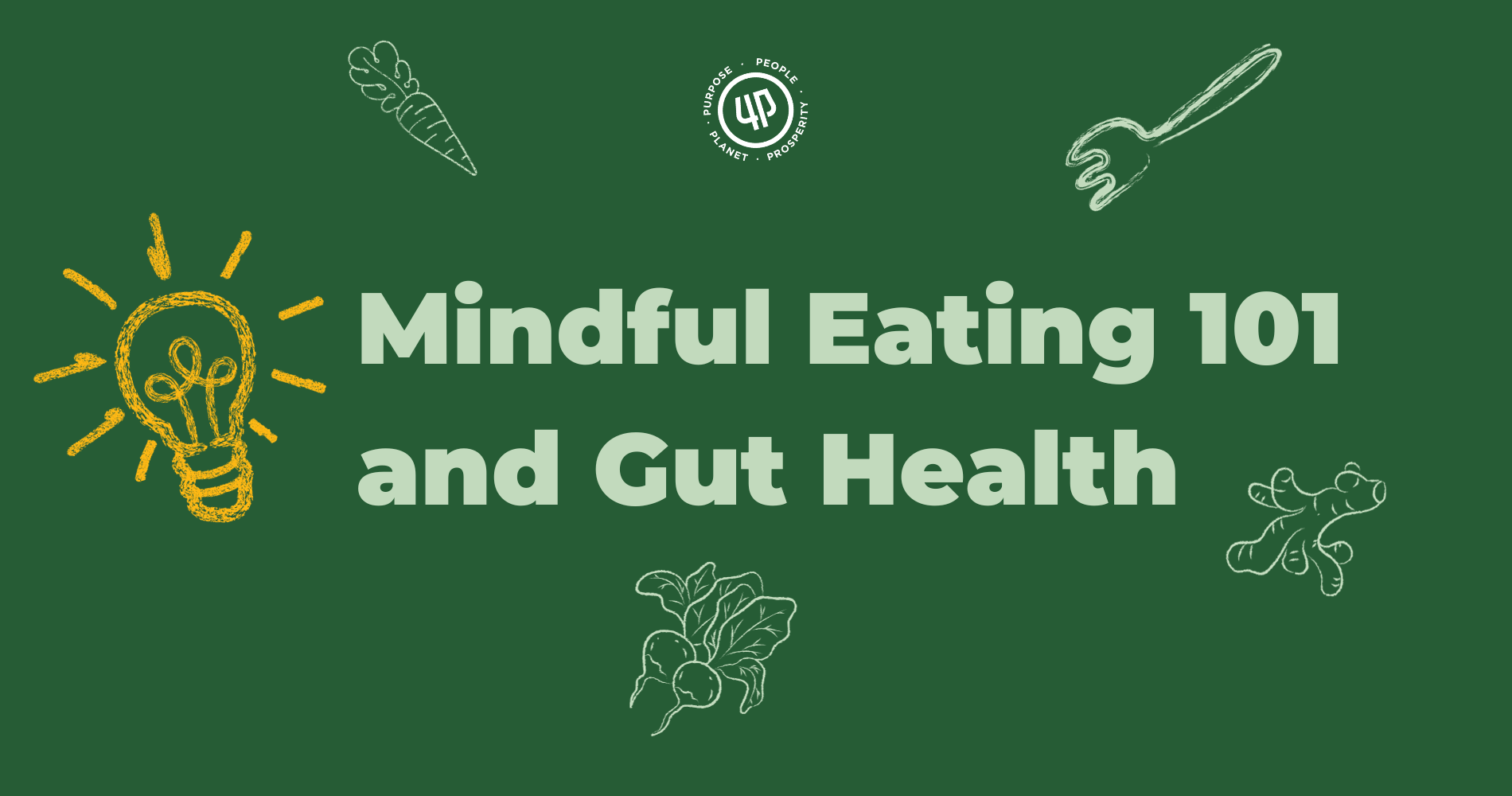
Mindful Eating 101 and Gut Health
January 05, 2024 by 4P Foods
Deep breath. What does your food smell like? Let’s not eat in front of a screen. What does your food look like? Sit down and arrive at the meal.
Proper digestion begins with your body being in parasympathetic mode. This means you're in “rest and digest” mode, which is the opposite of “fight or flight”. While we often eat on-the-go, eat at our desks while still working, or eat while enjoying our favorite show at the end of the day, these habits could be keeping us from a healthy gut and be keeping us from enjoying our meal fully.
“Relaxing before diving into a meal greatly improves digestion, but beyond physiological benefits, bringing mindfulness into your daily diet enhances flavors and appreciation of what is on your plate. This can lead to less wasted nutrients, less overeating, and even raise awareness of where the food came from and how it was prepared.” says Devon Byrne, Certified Functional Nutritional Therapy Practitioner.
4 Tips for mindful eating
- Eat sitting down. Standing up while eating gives up a hurried feeling and keeps us in ‘fight or flight’ mode. Try sitting down to slow down and enjoy your meal.
- Eat without distractions. Try eating without a screen in front of your face. This will allow you to focus on the food. What does it smell like? What does it taste like? Which part of the meal is your favorite? Make it a fun sensory experience.
- Count when you chew. It is recommended to chew your food 30-50 times per bite. Try it! Maybe you won’t make it to the 30th chew threshold, but actively thinking about the action will bring you into the moment. Plus, it's essential for the mechanical and chemical breakdown of your food.
- Try a different style of eating. Eat with your non-dominant hand to really focus on the action of using utensils. Eat with chopsticks if that is not something you do in your everyday life. You could also make a meal that is traditionally eaten with your hands. All of these new or different ways of eating will bring you into your body and help you focus on the meal.
“Physiologically, only until our bodies are in ‘rest mode’ can the brain trigger the release of digestive enzymes, which churn our food into absorbable nutrients. If we are constantly in a state of stress when eating, our food will not be broken down properly leading to nutrient deficiencies and digestive ailments.” says Devon Byrne.
Not being in “rest and digest” mode can lead to heartburn, increased burping, acid reflux, bloating, a development of food sensitivities, increased susceptibility to pathogenic microorganisms like parasites and bacteria, and leaky gut syndrome.
Mental health and gut health connection
A study by Jay Pasricha, M.D., director of the Johns Hopkins Center for Neurogastroenterology suggests a connection between depression and anxiety and gut health. The gut may trigger big emotional shifts in people who experience frequent constipation, diarrhea, and stomach pain.
“For decades, researchers and doctors thought that anxiety and depression contributed to these problems. But our studies and others show that it may also be the other way around,” says Jay Pasricha, M.D.
The drainage funnel: What is it?
The drainage funnel is the order your body moves fluid to remove toxins. It begins at the bottom with your digestive organs. So if your New Year’s resolution includes a detox and reset, then you’ll need to first lay the groundwork with gut health.
Recipes and foods to support your drainage funnel
- Support your colon with ginger, fiber-rich foods like root veggies, dark leafy greens, and legumes, and proper hydration.
- Support your liver and bile ducts with radishes, beets, healthy fats like avocados, and zinc-rich foods like nuts and legumes.
- Support your Lymphatic System with dandelion root, ginger and water. Effective non-food therapies are massage, physical activity, and a few minutes in the sauna.
Join 4P Foods on a gut health journey by adding the Gut Health Bundle to your cart.
Disclaimer: This post is for educational purposes only. No recommendation or comment made by a Functional Nutritional Therapy PractitionerTM should be construed as medical advice, prescription of remedies and therapies, or diagnosis.